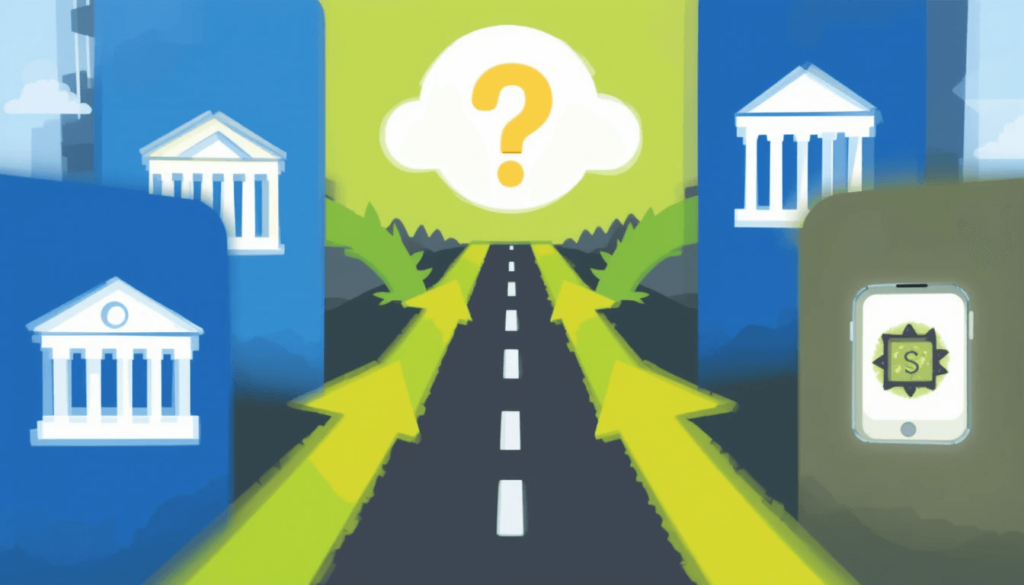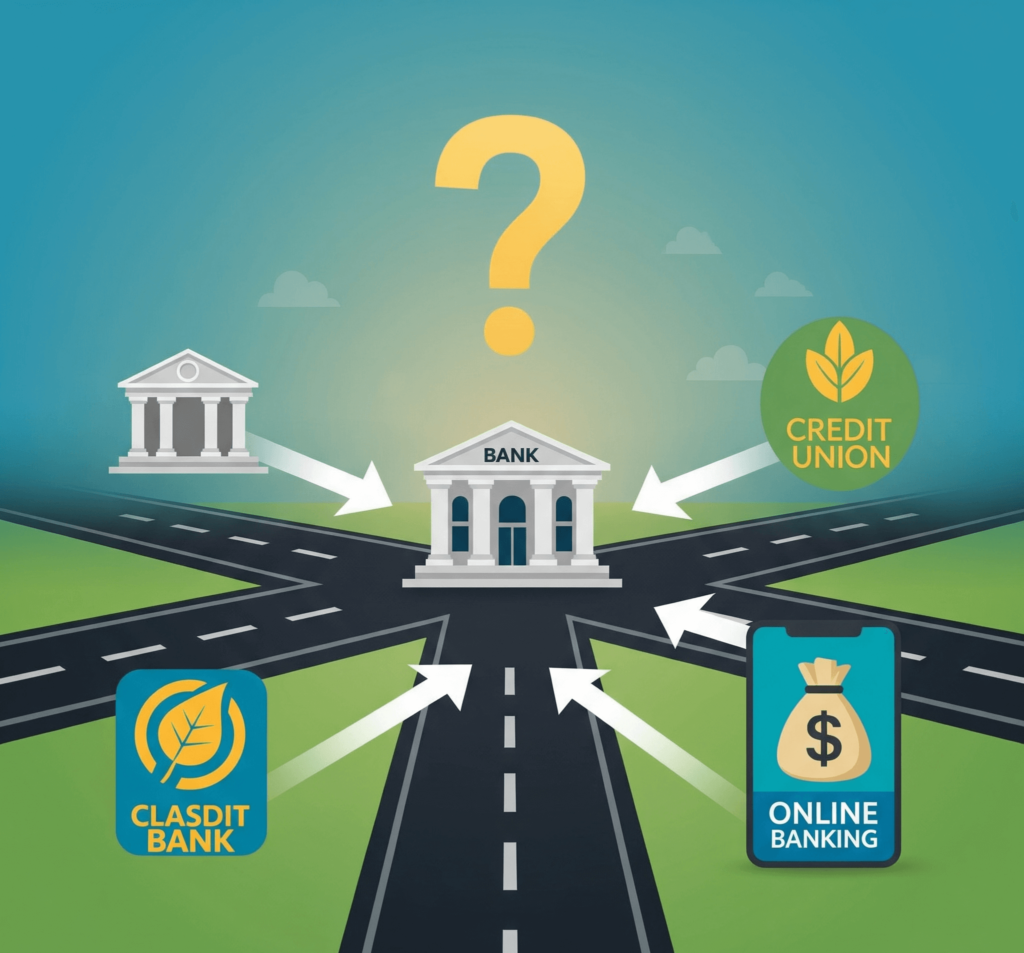See, back then, my financial literacy was somewhere between a goldfish and a houseplant. Seriously. I thought a debit card was just free money. Oh, the naivety! Anyway, fast forward a few (okay, maybe more than a few) years, and I’ve learned a thing or two. Mostly through trial and a whole lotta error. And a few overdraft fees that could’ve funded a small vacation. Don’t be like young me. Please.
So, you’re staring at a bunch of websites and maybe even walked into a couple of those places with the shiny floors and people in suits (who are surprisingly nice, usually), and you’re thinking, “Uh… help?” I get it. It’s overwhelming. Bank? Credit union? Online bank? What’s the actual difference, and does it even matter? (Spoiler again: it kinda does.)
Banks vs. Credit financial Unions: The Great Debate (My Totally Biased Opinion)
Okay, so this is usually the first big hurdle. Bank or credit union? It sounds like a really important decision, and in some ways, it is. But don’t let it paralyze you. Think of it like choosing between a big chain coffee place and that cool little local coffee shop down the street.
Banks, the big chains, are usually for-profit. They’ve got shareholders to keep happy, which sometimes means… well, fees. They also tend to have a wider reach, more ATMs, and fancier apps with all the bells and whistles. Think of them as the Starbucks of the financial world. They’re everywhere, you know what to expect (mostly), and they’ve probably got that one complicated latte you really like (but secretly costs too much).
Credit unions, on the other hand, are non-profit and member-owned. Think of them as that cozy little local coffee shop. They’re often more focused on serving their members (that’s you, if you join!) than on making massive profits. This can translate to lower fees, better interest rates on savings accounts and loans, and a more personal touch. The catch? You usually need to meet certain membership requirements, like living, working, or belonging to a specific group in order to join. And their tech or branch network might not be as extensive as the big banks.
Personally? I’ve leaned more towards credit unions as I’ve gotten older and (hopefully) a little wiser about my money. There’s just something about the idea of being a member and not just a customer that sits better with me. Plus, those lower fees? HUGE. Remember those vacation-funding overdraft fees? Yeah, those happened at a big bank. Just sayin’.
What the Heck Do You Actually Need? (This is Where You Get Real financial With Yourself)
Before you even start financial comparing institutions, you gotta ask yourself: what do I actually need from a bank or credit union? Like, what’s the absolute must-have stuff?
Customer Service: This is a biggie that people often overlook. How easy is it to get in touch with someone when you have a problem? Are they helpful or do they make you feel like you’ve interrupted their very important game of solitaire? (I’ve had both experiences, and trust me, the helpful ones are worth their weight in gold.
Checking Account: Duh, right? But what kind? Do you need a ton of checks? (Who even uses checks anymore, except my grandma? Love you, Nana!) Do you need mobile check deposit? (Pretty much essential these days, unless you enjoy waiting in line. Which, let’s be honest, nobody does.)
Savings Account: Are you trying to actually save money (good for you!) or just need a place to park a little extra cash? Are you looking for high-yield savings? (Spoiler: the rates are usually better at online banks or some credit unions.)
Loans: Do you see a car or a house in your future? Or maybe just need a credit card to build credit (use it wisely, my friend, wisely!). Different institutions offer different rates and terms, so this is a big one to consider.
ATM Access: How often do you actually use cash? If you’re like me and mostly use your debit card or phone to pay, this might not be a huge deal. But if you’re a cash-is-king financial person, you’ll want to make sure they have a decent ATM network or reimburse fees for using other ATMs. (Those fees add up faster than you think!)
Online and Mobile Banking: This is non-negotiable in today’s world, in my humble opinion. Can you pay bills online easily? Is their mobile app user-friendly or does it look like it was designed in the Stone Age? (I’ve seen some that feel that old, no joke.) Can you transfer money easily? Can you see your balance without having to log in twenty different times with a secret handshake and a blood sample? (Okay, maybe a slight exaggeration, but you get my point.)
Customer Service: This is a biggie that people often overlook. How easy is it to get in touch with someone when you have a problem? Are they helpful or do they make you feel like you’ve interrupted their very important game of solitaire? (I’ve had both experiences, and trust me, the helpful ones are worth their weight in gold.)

Like, seriously, remember that time my debit card got eaten by an ATM? (Yeah, that happened. In broad daylight. I swear, that machine had a vendetta against me.) Trying to get that sorted out with some banks was like pulling teeth. But the one time it happened with my credit union? They were super helpful, calmed me down (because I was totally panicking, obviously), and got me a new card super quick. That personal touch? It financial matters.
Digging into the Nitty-Gritty: Fees, Rates, and Other Scary-Sounding Words
Okay, deep breaths. We talk about the less fun stuff: fees and rates. I know, I know, it’s like doing your taxes. But trust me, a little bit of digging here can save you a whole lot of headache (and money) down the road.
Fees, Glorious Fees (Said with Maximum Sarcasm): Oh boy, where do I even start? There are maintenance fees (just for having an account, because why not?), overdraft fees (the bane of my existence in my younger years), ATM fees (especially if you’re not using their ATMs), wire transfer fees (if you ever need to send money to someone in a hurry), and a whole bunch of other fees I probably don’t even know about.
The trick here is to be a fee detective. Look at the fine print (yes, I know it’s boring). Ask questions. Don’t be afraid to be that annoying customer who wants to know about every single potential fee. It’s your money, you have the right to know where it’s going (besides that impulse online shopping spree you might or might not have indulged in last night).
Interest Rates: Making Your Money (Maybe) Grow: This is where things get a little more exciting, especially when it comes to savings accounts and loans.
Credit Cards: Pay attention to the APR (Annual Percentage Rate). This is the interest rate you’ll be charged if you carry a balance on your credit card. Ideally, you want to pay your balance in full every month to avoid interest charges altogether (that’s the responsible adult thing to do, which I aspire to be most of the time). Also look at rewards programs – some cards offer cash back, travel points, etc., but make sure the rewards are actually useful to you and that the fees (annual fees, etc.) don’t outweigh the benefits.

Honestly, dealing with fees and rates can feel like learning a whole new language. But there are tons of resources out there to help you understand it all. Don’t be afraid to Google stuff! (Seriously, I Google financial terms all the time. It’s okay.)
financial Location (Does It Still Matter?)
Remember my 18-year-old self picking a bank based solely on proximity to my mom’s house? While convenience is still a factor, it’s probably not the only factor you should consider these days.
With online banking being so prevalent, you might not even need a physical branch that often. But if you’re someone who prefers to do your banking in person, then branch locations and hours are definitely something to think about. Do they have branches in convenient locations for you (near your home, work, etc.)? Are their hours convenient for your schedule?
ATM access is another location-related factor. If you travel a lot or live in an area where your bank or credit union doesn’t have many ATMs, you’ll want to look for one that either has a large network or reimburses ATM fees.
That being said, don’t rule out online banks just because they don’t have physical branches. They often offer better interest rates and lower fees because they have less overhead. And their online and mobile services are usually top-notch. It’s all about what works best for your individual needs and preferences. How to Use a Retirement Calculator to Plan Early?
My Totally Unsolicited financial Advice (Take It or Leave It)
Okay, friend, here’s where I get a little bossy (in a friendly way, I promise!). Here’s my totally unsolicited advice on how to choose between financial institutions:
Trust Your Gut: Sometimes, you just get a good or bad feeling about a particular institution. If something feels off, it’s okay to walk away.
Figure Out Your Needs (Seriously): Make a list of what’s most important to you. Checking? Savings? Loans? Mobile banking? In-person service? Be honest with yourself.
Do Your Homework: Don’t just go with the first bank or credit union you see. Compare a few different options. Look at their fees, interest rates, services, and customer reviews.
Don’t Be Afraid to Ask Questions: Talk to representatives at different institutions. Ask them about their fees, their services, and anything else you’re unsure about. If they can’t answer your questions clearly or seem evasive, that’s probably a red flag.
Read the Fine Print (I Know, It Sucks, But Do It): Understand the terms and conditions of any account or service you’re considering. Pay special attention to the fee schedule.
Consider the Long Term: Think about where you see yourself financially in the future. Will this bank or credit union be able to meet your needs as they evolve?
Trust Your Gut: Sometimes, you just get a good or bad feeling about a particular institution. If something feels off, it’s okay to walk away.

Choosing a financial institution might not be the most thrilling task in the world, but it’s an important one. It’s where you’ll be keeping your hard-earned money, after all. So take your time, do your research, and don’t be afraid to ask for help. And hey, if you make a mistake? It’s not the end of the world. You can always switch later. (Trust me, I’ve done it. More than once.)
Good luck, my friend! And may your future be filled with low fees and high interest rates! Now, if you’ll excuse me, I suddenly have the urge for a complicated latte. But I’m gonna get it from that little local coffee shop. You know, for research purposes.





